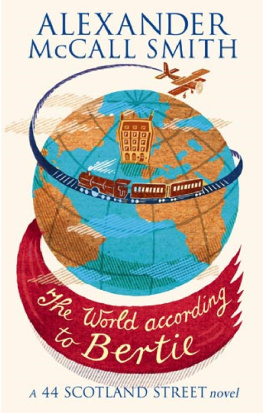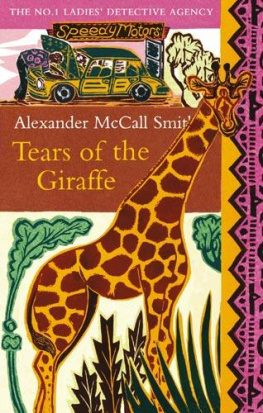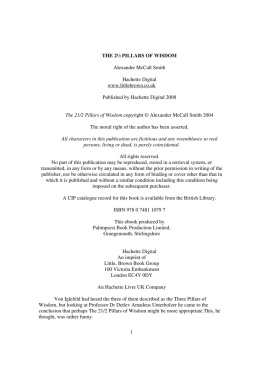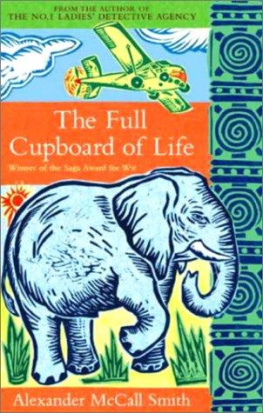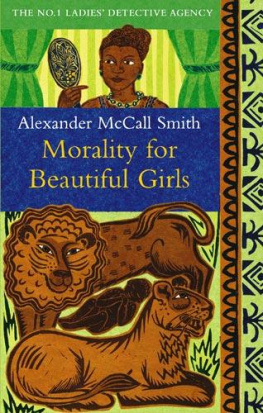Alexander McCall Smith - The Kalahari Typing School for Men (No.1 Ladies Detective Agency)
Here you can read online Alexander McCall Smith - The Kalahari Typing School for Men (No.1 Ladies Detective Agency) full text of the book (entire story) in english for free. Download pdf and epub, get meaning, cover and reviews about this ebook. year: 2004, publisher: Abacus, genre: Prose. Description of the work, (preface) as well as reviews are available. Best literature library LitArk.com created for fans of good reading and offers a wide selection of genres:
Romance novel
Science fiction
Adventure
Detective
Science
History
Home and family
Prose
Art
Politics
Computer
Non-fiction
Religion
Business
Children
Humor
Choose a favorite category and find really read worthwhile books. Enjoy immersion in the world of imagination, feel the emotions of the characters or learn something new for yourself, make an fascinating discovery.

- Book:The Kalahari Typing School for Men (No.1 Ladies Detective Agency)
- Author:
- Publisher:Abacus
- Genre:
- Year:2004
- Rating:5 / 5
- Favourites:Add to favourites
- Your mark:
- 100
- 1
- 2
- 3
- 4
- 5
The Kalahari Typing School for Men (No.1 Ladies Detective Agency): summary, description and annotation
We offer to read an annotation, description, summary or preface (depends on what the author of the book "The Kalahari Typing School for Men (No.1 Ladies Detective Agency)" wrote himself). If you haven't found the necessary information about the book — write in the comments, we will try to find it.
Alexander McCall Smith: author's other books
Who wrote The Kalahari Typing School for Men (No.1 Ladies Detective Agency)? Find out the surname, the name of the author of the book and a list of all author's works by series.
The Kalahari Typing School for Men (No.1 Ladies Detective Agency) — read online for free the complete book (whole text) full work
Below is the text of the book, divided by pages. System saving the place of the last page read, allows you to conveniently read the book "The Kalahari Typing School for Men (No.1 Ladies Detective Agency)" online for free, without having to search again every time where you left off. Put a bookmark, and you can go to the page where you finished reading at any time.
Font size:
Interval:
Bookmark:
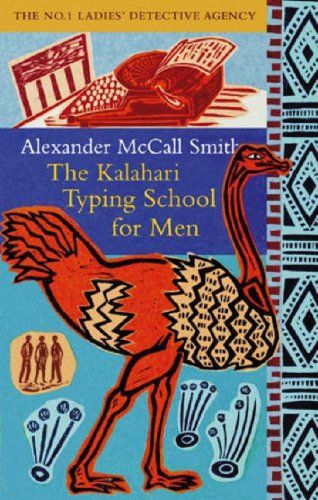 |
Alexander McCall Smith
The Kalahari Typing School For Men
The fourth book in the N1 Ladies Detective Agency series
2002
The Kalaharl Typing School for Men is the fourth novel in the widely acclaimed No.1 Ladies Detective Agency series. Following on from Morallty for Beautiful Girls we find Precious Ramotswe, the founder of Botswanas only detective agency now running her business from the garage of her fianc, that most gracious of men, Mr J.L.B. Matekoni. Having recovered from his illness, Mr J.L.B. Matekoni is back at the helm of Tlokweng Road Speedy Motors, and plans for the couples wedding need to be made. But when, If ever, will they wed? Intriguing cases present themselves and Mma Ramotswe juggles new clients with her usual formidable talent, but things become unusually complicated when her first-class assistant Mma Makutsi decides to expand the agency by opening a much-needed typing school for men. Amongst her puplis Mma Makutsl finds an admirer, but Mma Ramotswe, knowing how men are, decides to dig deeper.
How To Find a Man
I must remember, thought Mma Ramotswe, how fortunate I am in this life; at every moment, but especially now, sitting on the verandah of my house in Zebra Drive, and looking up at the high sky of Botswana, so empty that the blue is almost white. Here she was then, Precious Ramotswe, owner of Botswanas only detective agency, The N1 Ladies Detective Agencyan agency which by and large had lived up to its initial promise to provide satisfaction for its clients, although some of them, it must be said, could never be satisfied. And here she was too, somewhere in her late thirties, which as far as she was concerned was the very finest age to be; here she was with the house in Zebra Drive and two orphan children, a boy and a girl, bringing life and chatter into the home. These were blessings with which anybody should be content. With these things in ones life, one might well say that nothing more was needed.
But there was more. Some time ago, Mma Ramotswe had become engaged to Mr. J.L.B. Matekoni, proprietor of Tlokweng Road Speedy Motors, and by all accounts the finest mechanic in Botswana, a kind man, and a gentle one. Mma Ramotswe had been married once before, and the experience had been disastrous. Note Mokoti, the smartly dressed jazz trumpeter, might have been a young girls dream, but he soon turned out to be a wifes nightmare. There had been a daily diet of cruelty, of hurt given out like a ration, and when, after her fretful pregnancy, their tiny, premature baby had died in her arms, so few hours after it had struggled into life, Note had been off drinking in a shebeen somewhere. He had not even come to say good-bye to the little scrap of humanity that had meant so much to her and so little to him. When at last she left Note, Mma Ramotswe would never forget how her father, Obed Ramotswe, whom even today she called the Daddy, had welcomed her back and had said nothing about her husband, not once saying I knew this would happen. And from that time she had decided that she would never again marry unlessand this was surely impossibleshe met a man who could live up to the memory of the late Daddy, that fine man whom everybody respected for his knowledge of cattle and for his understanding of the old Botswana ways.
Naturally there had been offers. Her old friend Hector Mapondise had regularly asked her to marry him, and although she had just as regularly declined, he had always taken her refusals in good spirit, as befitted a man of his status (he was a cousin of a prominent chief). He would have made a perfectly good husband, but the problem was that he was rather dull and, try as she might, Mma Ramotswe could scarcely prevent herself from nodding off in his company. It would be very difficult being married to him; a somnolent experience, in fact, and Mma Ramotswe enjoyed life too much to want to sleep through it. Whenever she saw Hector Mapondise driving past in his large green car, or walking to the post office to collect his mail, she remembered the occasion on which he had taken her to lunch at the President Hotel and she had fallen asleep at the table, halfway through the meal. It had given a new meaning, she reflected, to the expression sleeping with a man. She had woken, slumped back in her chair, to see him staring at her with his slightly rheumy eyes, still talking in his low voice about some difficulty he was having with one of the machines at his factory.
Corrugated iron is not easy to handle, he was saying. You need very special machines to push the iron into that shape. Do you know that, Mma Ramotswe? Do you know why corrugated iron is the shape it is?
Mma Ramotswe had not thought about this. Corrugated iron was widely used for roofing: was it, then, something to do with providing ridges for the rain to run off? But why would that be necessary in a dry country like Botswana? There must be some other reason, she imagined, although it was not immediately apparent to her. The thought of it, however, made her feel drowsy again, and she struggled to keep her eyes open.
No, Hector Mapondise was a worthy man, but far too dull. He should seek out a dull woman, of whom there were legions throughout the country, women who were slow-moving and not very exciting, and he should marry one of these bovine ladies. But the problem was that dull men often had no interest in such women and fell for people like Mma Ramotswe. That was the trouble with people in general: they were surprisingly unrealistic in their expectations. Mma Ramotswe smiled at the thought, remembering how, as a young woman, she had had a very tall friend who had been loved by an extremely short man. The short man looked up at the face of his beloved, from almost below her waist, and she looked down at him, almost squinting over the distance that separated them. That distance could have been one thousand miles or morethe breadth of the Kalahari and back; but the short man was not to realise that, and was to desist, heartsore, only when the tall girls equally tall brother stooped down to look into his eyes and told him that he was no longer to look at his sister, even from a distance, or he would face some dire, unexpressed consequence. Mma Ramotswe felt sorry for the short man, of course, as she could never find it in herself to dismiss the feelings of others; he should have realised how impossible were his ambitions, but people never did.
Mr. J.L.B. Matekoni was a very good man, but, unlike Hector Mapondise, he could not be described as dull. That was not to say that he was exciting, in the way in which Note had seemed exciting; he was just easy company. You could sit with Mr. J.L.B. Matekoni for hours, during which he might say nothing very important, but what he said was never tedious. Certainly he talked about cars a great deal, as most men did, but what he had to say about them was very much more interesting than what other men had to say on the subject. Mr. J.L.B. Matekoni regarded cars as having personalities, and he could tell just by looking at a car what sort of owner it had.
Cars speak about people, he had once explained to her. They tell you everything you need to know.
It had struck Mma Ramotswe as a strange thing to say, but Mr. J.L.B. Matekoni had gone on to illustrate his point with a number of telling examples. Had she ever seen the inside of the car belonging to Mr. Motobedi Palati, for example? He was an untidy man, whose tie was never straight and whose shirt was permanently hanging out of his trousers. Not surprisingly, the inside of his car was a mess, with unattached wires sticking out from under the dashboard and a hole underneath the drivers seatso that dust swirled up into the car and covered everything with a brown layer. Or what about that rather intimidating nursing sister from the Princess Marina Hospital, the one who had humiliated a well-known politician when she had heckled him at a public meeting, raising questions about nurses pay that he simply could not answer? Her car, as one might expect, was in pristine condition and smelled vaguely of antiseptic. He could come up with further examples if she wished, but the point was made, and Mma Ramotswe nodded her head in understanding.
Font size:
Interval:
Bookmark:
Similar books «The Kalahari Typing School for Men (No.1 Ladies Detective Agency)»
Look at similar books to The Kalahari Typing School for Men (No.1 Ladies Detective Agency). We have selected literature similar in name and meaning in the hope of providing readers with more options to find new, interesting, not yet read works.
Discussion, reviews of the book The Kalahari Typing School for Men (No.1 Ladies Detective Agency) and just readers' own opinions. Leave your comments, write what you think about the work, its meaning or the main characters. Specify what exactly you liked and what you didn't like, and why you think so.

